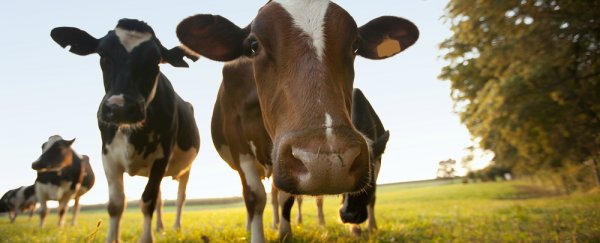Agriculture contributes approximately 35 percent of the planet's greenhouse gas emissions, but scientists in China believe they've found a way to make the (undeniably essential) practice more sustainable, by successfully turning a farm into a carbon sink.
By replacing chemical fertilisers with organic compost, the team from the Chinese Academy of Sciences report that they've created a farm that stores more carbon in its soil than it emits. And most impressively, they've proved that the crop yields didn't need to suffer.
This isn't the first time scientists have proposed that using organic compost could help reduce greenhouse gas emissions by improving the health and, as a result, the carbon content of soil. Back in 2008, a report published in Waste Management & Research estimated that the use of organic fertilisers could turn around 20 percent of the agricultural land in the European Union into a carbon sink, capable of locking away millions of tonnes of carbon from the atmosphere.
But the problem is that organic farms have lower yields than farms that rely on nitrogen-based fertilisers, and so going organic hasn't been considered a viable way to reduce greenhouse gas emissions. After all, what's the point in storing lots of carbon if the world starves in the process?
However, Chinese scientists have now demonstrated that, by using cattle manure as fertiliser, they can maintain high crop yields while decreasing greenhouse gas emissions. This is all thanks to soil, which, when treated with organic compost such as manure, is better able to retain water and nutrients.
The experiments were conducted on an eco-farm in eastern rural China that contains cattle and a rotation of crops - corn is grown in the summer and wheat in the winter - and to compare the effect of using organic compost, the researchers trialed four different systems.
In the fully organic system, no chemical fertiliser was used at all. The team simply used cattle manure to compost the crops, and then fed the cattle the leftover crop residue. The researchers also grew the crops using a mix of 75 per cent organic compost and 25 percent nitrogen fertiliser, a 50/50 balance, and 100 percent nitrogen fertiliser.
They monitored crop yield carefully, and calculated the greenhouse gas emissions according to the International Panel on Climate Change (IPCC) guidelines. This included calculating the cattle's methane emissions. They've created an illustration of their system below:
 Science China Press
Science China Press
They found that using any amount of organic compost turned their farm from a carbon source into a carbon sink. But the more manure that was used, the better, with the fully organic system capable of storing the equivalent of 8.8 tonnes of CO2 annually for each hectare. The nitrogen fertiliser system, on the other hand, pumped out the equivalent of 2.7 tonnes of CO2 per hectare per year. The results are published in the journal Science Bulletin.
Interestingly, there was no significant difference between the crop yields across the four different systems. However, a mix of organic compost and nitrogen fertiliser produced the best yields, while also decreasing greenhouse gas emissions, the researchers report.
"Making full use of crop residues as forage for cattle, collecting and composting cattle manure, and replacing part of the chemical fertiliser input with organic manure have been successfully shown to be ideal choices to reduce energy waste and cut [greenhouse gas] emissions without crop yield losses," the press release explains.
Of course, this experiment doesn't take into account many of the other greenhouse gas emitting aspects of agriculture and food production, such as transport, packaging and waste. And we'd love to see these results replicated across larger farms and with different types of crops and livestock. But it's a positive early indication that not all farming has to be destructive.
In fact, these results suggest that if we could structure it correctly, we could help mitigate the effects of global warming, while feeding the world at the same time. And we're pretty sure that's the ultimate realisation of having your cake and eating it too.
